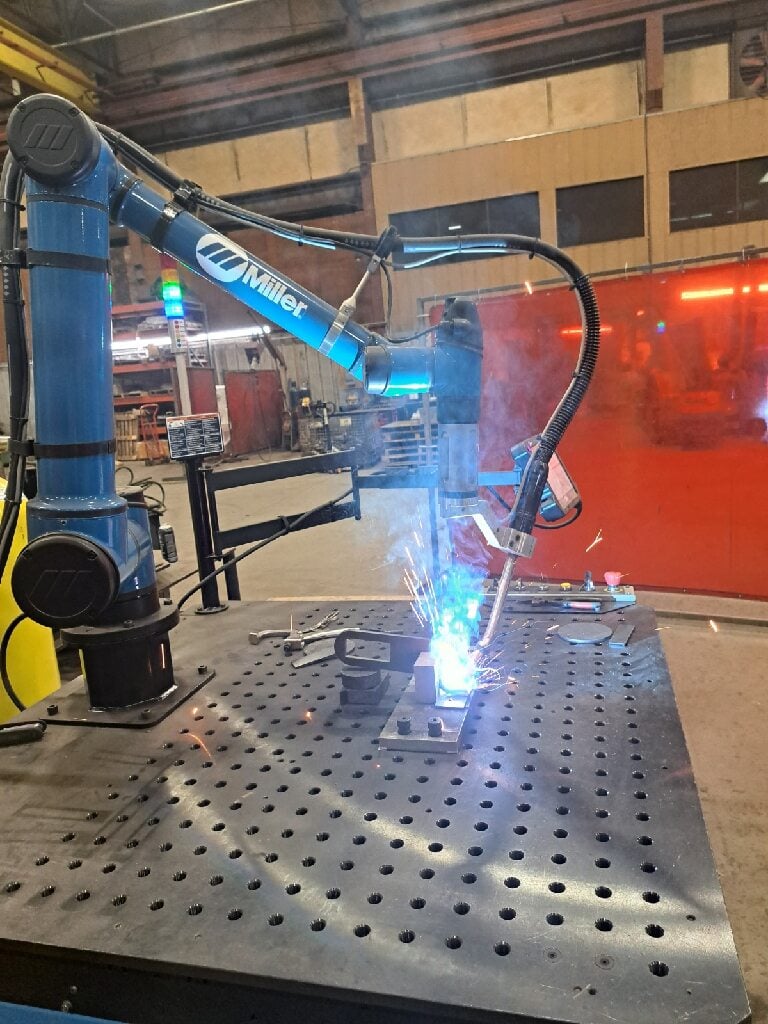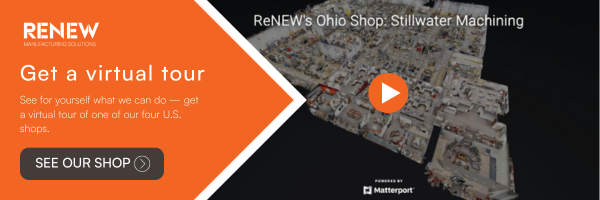Robotic Manufacturing: Today’s Capabilities and Tomorrow’s Vision

Robotics and automation are no longer futuristic concepts, but have already begun transforming the manufacturing industry. Robotic manufacturing is reshaping how businesses like ReNEW Manufacturing Solutions operate in every aspect of production.
But manufacturers can no longer focus only on how robotics can help their precision machine shop today. As advances in artificial intelligence make systems like humanoid robots possible, manufacturers who want to stay on the cutting-edge need to look ahead to what the next wave of innovation might bring.
Let’s walk through some of the cutting-edge robotic technologies manufacturers are already using to improve speed and consistency, and then explore how we see the future of manufacturing.
Leveraging Today’s Robotic Manufacturing Technologies
Across the manufacturing industry, advanced technologies are driving down lead times and streamlining processes, from modern SaaS software that accelerates quoting to machine monitoring solutions that provide real-time insights into production. But some of the most transformative advancements have come from physical automation—specifically robotics. Here are a few of the most interesting automated technologies we’ve adopted at ReNEW:
Robotic Part Pickers
Picking and sorting parts, once a tedious and time-consuming manual task, can now be handled by robotic systems. These robots load material into CNC machines and transfer finished parts for inspection or assembly.
While robotic pickers aren’t always faster than humans, they significantly reduce idle time. Team members no longer have to stand by machines waiting for a cycle to finish—now they can spend that time on high-value tasks. For us, this automation isn’t about cost savings, but instead about enabling our employees to do more meaningful work.
Cobots and Robots at Machining Centers
With the labor shortage in the manufacturing industry, companies must continually find ways to do more with fewer people. Advances in robotics have allowed many shops like ours to implement cobots and robots at machining centers, enabling capabilities like lights-out manufacturing.
But that doesn’t mean experienced machinists are any less essential. With our specialty in high-mix, low-volume manufacturing, we rely heavily on our machinists to both set up parts and machine smaller production orders that aren’t well-suited to automation. Combining the skills of our machinists with advanced robotic manufacturing technologies, we’ve been able to drive down lead times and keep production running 24/7.
Robotic Welding
As with experienced machinists, skilled welders are increasingly hard to find. However, by leveraging the capabilities of welding robots, we can produce clean, consistent welds without requiring every operator to be a seasoned expert.
Once the robot is programmed and set up, robotic welders are able to weld part after part with incredible consistency. This makes it easier to hire new staff for the department or cross-train employees, leading to significantly increased productivity—in part because welding is a common site of production bottlenecks.
The Precision Machine Shop of the Future: Humanoid Robots on the Shop Floor?
Though it’s impossible to know what new technologies will emerge to change the shape of our industry, we may now be glimpsing the early signs of the next revolution in manufacturing solutions. Today’s advanced automation may soon feel primitive.
Humanoid robots, currently being developed by companies like Tesla, Boston Dynamics, and others, could eventually take on more complex tasks in industrial environments. Large factories like BMW are already experimenting with them on factor floors.
Will Humanoid Robots Replace Workers in Manufacturing?
In any discussion of advanced robotics and AI technologies, concerns about job loss naturally come up. We believe humanoid robots may replace humans in certain repetitive functions or physically demanding tasks, but we see a future where people and humanoid robots work in complementary roles.
In machine shops, humans are still critical for tasks that require reasoning, manual dexterity, and quick adaptability. Even as robots become more capable, there will always be work that requires a human touch and judgment.
Regardless of what robots will or won’t be able to do production-wise in the machine shop, there will always be a need for people. After all, at its core, the manufacturing industry is built on the relationships and personal service that only other humans can provide.
Building the Future at ReNEW Manufacturing Solutions
As robotic manufacturing technologies continue to evolve, the shops that embrace them today are positioning themselves to lead tomorrow. At ReNEW Manufacturing Solutions, we’re not just watching the future unfold—we’re actively building it by combining advanced automation with the skills that only our machinists can provide.
Across our machine shops and custom metal fabrication facilities, we leverage automation and robotic manufacturing technologies wherever possible. With technologies like these, we’ve been able to enhance efficiency, streamline production, and reduce lead times. And we’re just getting started.
If you’re looking for a future-focused contract manufacturing partner to drive success for your next project, request a quote and let’s discuss what our investments in robotics and automation can help you achieve.





